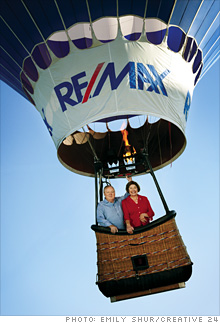Surviving recession #5: The Re/Max startup story
Groundbreaking real estate firm Re/Max has survived debt, management challenges, five recessions and a plane crash.
 |
| After a rocky start, sales took off for the Lingers. |
(Fortune Small Business) -- When Dave Liniger opened a real estate company in Denver, his first hire was Gail Main, a former Ralston Purina customer service supervisor, to serve as the firm's vice president of administration. As Dave recruited real estate agents and Gail managed the office, the two forged a professional partnership, fell in love, got married -- and changed their industry with a new revenue-sharing model.
The Linigers still run Re/Max International, the world's largest real estate brand, with more than 6,000 offices in 74 countries. In 2008, Re/Max -- short for Real Estate Maximums -- generated approximately $300 billion in transactions worldwide. Thirty-six years after hiring their first agent, the 64-year-olds talked to Fortune Small Business about surviving financial woes, health setbacks and their early days as co-owners of the privately held firm.
Why did you decide to start Re/Max?
DAVE: I had worked for three real estate companies. In the early '70s most companies split commissions fifty-fifty with agents and paid for overhead. Others kept most of the commissions, paid for overhead and charged agents -- usually hungry and less-experienced ones -- for desks and support services.
Under our plan, agents would keep 100% of their commissions and pay a management fee to the organization. Re/Max would share common expenses, such as rent and utilities, with the agents and charge them for individual ones, including advertising and signs.
GAIL: I had just moved to Denver from St. Louis, and Dave sold me on the idea.
Were agents as receptive?
GAIL: When we launched in January 1973, the competition feared we'd steal their best talent. But recruitment was slow because the concept was unproven.
DAVE: Other companies' top producers didn't want to gamble on us. So we attracted entrepreneurial mavericks, working with 21 agents that first year.
The two largest companies in town hired women, but only as bookkeepers, secretaries and paralegals. All of their agents were men. I just wanted to build a company with anyone who wanted to work. Approximately 75% of my sales force was female. After we became the top seller in Colorado in 1978, 200 male agents left those companies to join us.
How difficult were the early years?
GAIL: We started in a recession and lost our financing because investors disappeared. We opened eight offices throughout the Denver metro area but spent our first two years more than $600,000 in debt. When things got really bad, we both stopped taking paychecks. Dave recruited sales associates, and I handled bill collectors. I talked with them regularly to work out installment payments. We started to turn the corner in 1975. By 1977 everything was paid off.
DAVE: I was an incompetent manager initially. In 1975 our eight branch managers were frustrated, tired of working for me and sick of dealing with bill collectors. They decided to revolt and start their own company. They hoped the agents would follow them, but the agents remained loyal to me and stayed on. The managers approached me sheepishly and said, "Guess you want our resignations."
"No," I told them, "because I can't make this work without you." That year, when I started regionalizing the country to sell franchises, these managers became Denver franchisees.
When did you expand internationally?
DAVE: We regionalized Canada in 1980, but most of our global expansion started in 1990. We've now got 16,000 agents in Europe and expect to double that in five years. Next we'll expand into Asia.
How has the recession affected business?
DAVE: We're still highly profitable. This is our fifth recession, and it's the hardest yet. We used to handle more high-end properties. Today jumbo mortgages are difficult to find. Half of all home buyers are inexperienced, so we've adapted and changed our agent training programs. You succeed by working the foreclosed and distressed properties until the higher-end market returns.
We geared up rapidly to make this transition when we saw the market changing in late 2006. We feel we're coming out of the housing recession, but recovery will be slow.
What's the biggest crisis the company faced?
GAIL: In October 1983 we did a convention in Canada. After the meeting one of our broker-owners arranged a seaplane ride for several of us [Dave wasn't on board], and we crashed. The pilot was killed, and everyone else was hurt.
My injury paralyzed my left side, and I lost peripheral vision in both eyes. After six months of excellent therapy, I was walking again. Now I can get around without using my left arm and side. I type one-handed.
DAVE: I spent six months with Gail in the hospital, and the management team ran the company. That's when we got romantically involved -- 10 years after we started the business.
Once Gail got through her surgeries, neither of us wanted a big wedding. So we decided to marry in our office. My children [from a former marriage] and a few senior company officers attended. The wedding location surprised some, but it made sense to us because that's where everything started. ![]()
-
The Cheesecake Factory created smaller portions to survive the downturn. Play
-
A breeder of award-winning marijuana seeds is following the money and heading to the U.S. More
-
Most small businesses die within five years, but Amish businesses have a survival rate north of 90%. More
-
The 10 most popular franchise brands over the past decade -- and their failure rates. More
-
These firms are the last left in America making iconic products now in their twilight. More










